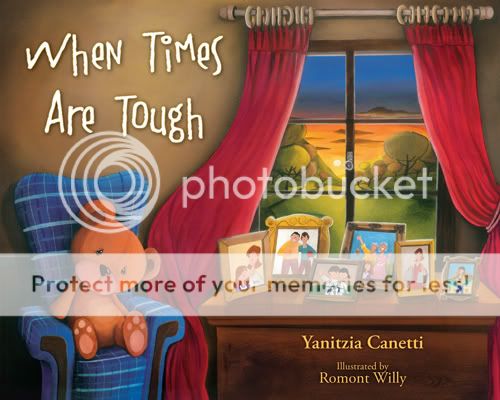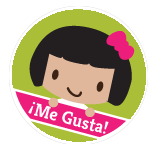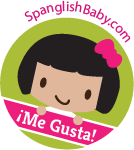
Most of us have been affected one way or another by the economic woes this country has been through in the last couple of years. And, although children might be too young to understand all the implications and repercussions of a bad economy, they are not blind to the changes these bring about in their lives.
Yet, at least for me, money is one of the toughest subjects to talk about with children. And, if you have a preschooler, you probably know all too well how they never get tired of asking “why?” or any other question, for that matter. But, how do you explain financial concepts to children when you’re not an expert yourself?
Enter this month’s ReadMe book, En tiempos difíciles, by Yanitizia Canetti.
“With this book, I attempt to answer these questions with sensibility, taking into account the psychology of a child,” she explains. “It is also a book that champions a united family, love, and creative ways to solve problems.”
The subject matter is extremely relevant and I can’t think of a better way to talk to your children about money than through the eyes of a child whose life is changing because his family is going through some tough economic times.
Canetti explains that she got the idea for the book from all the stories she started hearing about families who’d become desperate after losing their financial stability. She decided to write En tiempos difíciles based on a phrase her grandmother always used to say, “al mal tiempo, buena cara,” which means that even during difficult times, you should try to look at the bright side a situation. I think this is a great way to explain a scary concept to a child because you allow them to see that there are different ways to look at life’s problems.
“The best way I have to express feelings is through literature, so I wanted to write something for those who have to bear the most during this crisis; the innocent victims of something they are not yet able to comprehend,” says Canetti. “However, it is not only directed at children, but also to anyone who feels that he or she has reached a dead end with no way out and who can’t imagine that this is only part of a process, that there is always a calm after the storm. I hope that with this book I can help lift the spirits of those who feel depressed due to the crisis, or those who wish to help others face problems with faith and optimism.”
If the author’s name sounds familiar, it might be because besides being an award-winning writer, Canetti is also responsible for the translation of more than 100 children’s book, including classics like Dr. Seuss, Berenstein Bears, Amelia Bedelia and Curious George. En tiempos difíciles, which is also available in English, is published by BrickHouse Education, an educational publisher with lots of Spanish and bilingual titles you should all check out, particularly if you’re homeschooling.
“All books published by BrickHouse Education contribute to the formation of bilingual students. What is special about these books is that they offer a robust cultural vision of the world that students live in: it is a multicultural, interconnected, interdependent, diverse, and fast-paced world where every advance in technology imposes new challenges in acquiring knowledge,” explains Canetti. “It is necessary—almost indispensable—to know more than one language in today’s world, and this will be especially true in the future. This book is one step toward that objective. It allows us to assimilate the same point of view in two languages and two cultures.”
Canetti, who is trilingual (Spanish, English and Italian), wrote the book in Spanish, which is her first language.
“I write some books in English when the muses come to me speaking that language,” she says. “However, most of my books flow with the rhythm of my native tongue.”
The author’s children are bilingual and she firmly believes and supports the idea of raising kids with more than one language and one culture early on.
According to Canetti: “[My children] grew up speaking two native languages. They listened to music in both of those languages at the same time. Being born in this country and being so influenced by English, they speak Spanish with an accent, but they understand the essence of both cultures and inherited the other cultures in the family. For this reason, children that speak two languages tend to be multicultural, not just bicultural. They have inherited the culture of the two languages they speak as well as the culture of their parents, the culture in the place they grew up, and the place where they were born, which are not always the same.”
SB: Were you raised bilingual? How was that experience?
“No, my native language is Spanish, even though I began to study English at a young age and spoke other languages that my father’s side of the family spoke, especially Italian. Speaking different languages for me was fun, enriching, and opened up new horizons to understanding the world, its history, and its culture. Today, I consider it a necessity and an act of social responsibility. I owe respect to the world I live in, which is more interrelated than ever in every sense. I cannot ignore how very rapidly I am interacting with all cultures and I have no desire to isolate myself. In addition to learning and perfecting other languages, I am eager to learn everything I can about cultures I do not yet know.”
SB: As a writer, can you talk about the importance of literacy among the Latino community?
“As a writer, I consider literacy and reading important not only for one community, but for all communities because as Socrates said, “I am not an Athenian, nor a Greek, but a citizen of the world”. Everything we see today corroborates this idea, especially in a place so multicultural and diverse as the United States. This is why it is hard for me to see communities as separate or isolated in such a mixed, integrated, and interactive world. I would have to start by understanding what exactly the Latino community is. I was born in Cuba, my family is of Sephardic origin and came from Switzerland, and I am an American citizen. Which community do I belong to, and under what criteria? I know a person born in Mexico who does not speak Spanish, but Nahuatl. I know of a girl born in the United States who does not speak Spanish, but her grandparents are Puerto Rican. Would she belong to the same community as a Spanish-speaking immigrant from Peru? I have a friend who does not know whether to consider herself Latina, Afro-Caribbean, or Indigenous because her ethnic features, her language, and her set of traditions is very mixed. I have noticed that people try to categorize others as part of the Latino community. However, not all of those people speak the same language, have the same customs or traditions, the same ethnic features, or even the same roots. Therefore, speaking about literacy for a very large and diverse community in its own right is difficult for me. I prefer to talk about people who belong to different communities without labeling anyone. A person may belong to several communities, not just one. I want to reiterate how important literacy is to everyone because all people mutually interact and enrich each other. Everyone comes into contact with someone else at some point in life.”
SB: How and why did you become a writer? Why write for children?
“I started writing as soon as I learned how. My first sentences were verses of a poem I had written for a teacher. It was a silly poem, but it was that poem that first piqued my interest: I needed to express myself through literature. I read a lot. In fact, I read everything I could get my hands on. I would make up my own ending or add a new character to a story I had just read. Writing for me was not a decision, but a way to tame a compulsion. Writing for me is like breathing. It is part of something so deep within me that I never proposed to become a writer as such. It came about in a very simple way. After writing and writing, one day I decided to share something I had written and I began to publish. I write for adults: novels, stories, and collections of poems. My interest in writing for children was always there because deep down, I will always be a playful and mischievous little girl. However, it was the birth of my children that made me take a break from adult literature and dedicate myself passionately to writing for the little ones. The advantage is that it is effortless. I write for them from their point of view, but with the experience of a person who has traveled some roads in life. It is like going down a slide and climbing up to slide down again: I enjoy it, I have fun, and I grow as I write for the demanding readers that children are.”
 Yanitzia Canetti is an award-winning children’s book author, novelist, and translator. With more than 100 books translated, Canetti has introduced Spanish speakers around the world to many children’s literature classics, including the Dr. Seuss series (for which she is the Official Spanish Translator), Curious George and other works by H.A. Rey, Amelia Bedelia, The Berenstain Bears, and First Lady Laura Bush and daughter Jenna Bush’s recent book, Read All About It.
Yanitzia Canetti is an award-winning children’s book author, novelist, and translator. With more than 100 books translated, Canetti has introduced Spanish speakers around the world to many children’s literature classics, including the Dr. Seuss series (for which she is the Official Spanish Translator), Curious George and other works by H.A. Rey, Amelia Bedelia, The Berenstain Bears, and First Lady Laura Bush and daughter Jenna Bush’s recent book, Read All About It.
In the field of education, Canetti has written and adapted fiction and nonfiction series, teacher’s guides, student editions, ancillary texts, and many other educational materials. She has also authored English, Spanish-language, and bilingual programs published by Houghton Mifflin and Harcourt, among other educational publishers.
Yanitzia Canetti fell in love with New England when she first visited in autumn, and the always-changing seasons often provide inspiration for her writing. She currently resides in Massachusetts with her husband and two young sons.
The Giveaway
This giveaway is now closed. Thanks to all for participating. CONGRATULATIONS to our winner #6 Adriana!
For your chance to win an autographed copy of En tiempos difíciles, please visit BrickHouse Education and come back here to let us know which other Spanish or bilingual title(s) caught your attention and why.
This giveaway ends at midnight EST on Sunday, August 8, 2010. Entries/Comments that do not follow the submission guidelines will be invalid and automatically deleted. Sorry, just need to keep it fair. Good luck to all!




The Yummy ABC’s caught my attention because I am teaching my daughter the abc’s right now & she loves food.
I like all the books but i would like to get ¿Quién me mira así? My son loves to read and he loves animals too, i think this would be the one he would want.
Wow! Que divertida coleccion! I really appreciated that English/Spanish were not necessarily direct translations, but adapted culturally and linguistically. The ABC books were a great example of this. The Canta y Cuenta books used “Arroz con Leche” for their Spanish tune, while the English books use “5 Monkeys jumping on the bed.” Thanks for turning us on to this resource. “La alegria de estar juntos” books would be my first (of many) choices.
WOW, such a great book for children and parents alike. Sometimes we as adults need to be reminded to look at the bright side. I love your books Había otra vez, how nice to have a different take on well known tails. Bien Hecho!
Yo también puedo ser presidente – I like how it shows the characteristics of a president in the children!
My son will attend a Spanish immersion preschool again this year and then we will officially start our bilingual homeschool the following year. I absolutely love the Alphabet books in Spanish. I plan to order all four of them for our home library. I think that they would make great Christmas gifts for Diego’s teachers next year also!
My husband and I are raising our children to be aware of differences because they are different and so we hope they can grow to be unique and original but most importantly happy and healthy. Titles such as Yo también puedo ser presidente and Soy original, ¡genial! would be perfect books to include in our growing library. Perhaps we have the next president, artist or philospher. What ever it may be we hope to expose them to a wide range of things that will produce a life dream.
Too many great books to pick from, great resource. We especially love the ABCedario salvage and plantas and my older son loves caperucita descolorida
The Yummy ABC’s sound awesome.
misusedinnocence@aol.com
Hi
This blog does not display appropriately on my iphone 4 – you may want to try and fix that